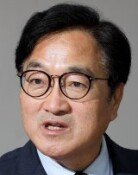Former Mayor of Seoul Announces MB Doctrine
Former Mayor of Seoul Announces MB Doctrine
Posted February. 07, 2007 07:05,
The Grand National Partys presidential candidate, Lee Myung-bak, who was formerly mayor of Seoul, has revealed his plan for foreign affairs and national security.
The plan is called his MB doctrine, which are his initials.
Lee announced the plan, which contains seven tasks and a principle for Korean diplomacy, at a briefing at the Seoul Foreign Correspondents Club held in the Korea Press Center in Jung-gu, Seoul on February 6.
A key to the MB doctrine is utilitarian diplomacy-
Lee has an ambition to achieve profits not only from the relationship with North Korea and neighboring countries, but also from all around the world.
First, he suggests a win-win plan for both North and South Korea, called the 3000 Embodiment for the de-nuclearization of the Korean Peninsula.
He said, A strategic policy which leads to actual changes is needed to open the door to North Korea, and if the North abolishes nuclear weapons, the South will help the North to be a nation with a $3,000 income level per capita within 10 years along with the international cooperation.
Moreover, he demanded that North Korean leader Kim Jong Il should give up nuclear weapons and open its doors.
Lee emphasized a practice of utilitarian diplomacy along with neighbor countries based on national interest.
He said, The relationship between South Korea and the U.S. should be developed in a way to enforce mutual interests and common values, and the two nations should prepare a strategic master plan. He added that he has the firm conviction that the estranged relationship between the two nations will be normalized in the next government.
Regarding China and Japan, he indirectly suggested a diplomatic direction that allows for autonomous diplomacy.
Answering a question from a Japanese journalist about Koreas diplomatic policy toward Japan, he said, It is pretty clear that the two countries should remain in a good relationship, but it is hard to say that President Roh is the only man who causes the current bad relationship between the two nations. Japans behavior, like visiting war shrines, distorting history and making distorted history books should bear responsibility for the current situation.
When a Chinese journalist asked, Do you see Chinese growth as a threat? he pointed out that what Korea concerns these days is the fact that historic problems like Chinas Northeast Project have appeared officially and unofficially. He added that if China makes an effort toward a peaceful relationship with neighbor countries, there would no nations who would be threatened by China.
Lee stressed that Asian diplomacy is important for the era of great Asia. He asserted that economic cooperation between neighboring countries such as Japan, China, Russia, India, ASEA, Australia, New Zealand and Central Asia is needed.
He also emphasized energy and cultural diplomacy. He said a new energy silk road should be built in order to secure stable resources, and that Koreas information technology culture would lead the nation to advance.
Former Foreign Minister Yoo Jong-ha and former UN representative Park Soo-gil played a crucial role in preparing the MB doctrine in Lees national security advisory team.
The Lee camp wants to raise his competitiveness by creating an image of an expert in foreign affairs and security for Lee, who is already recognized as an economic leader. Before the six-party talks, we needed to talk about our policies regarding neighboring countries, and it happened at the briefing at the Seoul Foreign Correspondents Club, said an insider of the Lee camp.
Regarding Lees announcement of the MB doctrine, former leader of the Grand National Party Park Geun-hye and former governor Sohn Hak-gyu did not express their opinions.
mhpark@donga.com







